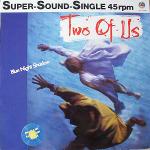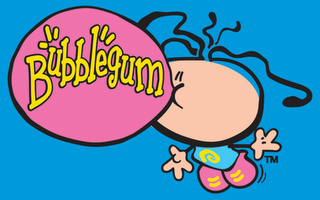The Cardigans, "If There Is A Chance" (2003)I was recently thinking about, of all things, the song "How Do You Keep The Music Playing?" Written by Michel Legrand, and Alan and Marilyn Bergman, the song was first performed by James Ingram and Patti Austin, though a check of the iTunes store reveals that it's been covered by quite a few illustrious artists since (Bennett, Barbra, Sinatra, Mathis, and, um, Nana Mouskouri). I'm more nonplussed than embarrassed to admit that I first encountered the song as purely as one could: not just sung by the original pair, but in its original setting too. I heard it, that is, during the Burt Reynolds-Goldie Hawn movie it was written for (by Barry Levinson with his then-wife!),
Best Friends. I have
no idea why I went to see the movie, but I have a very specific memory of being in the theatre by myself -- I must have been thirteen, though that hardly seems right -- and can even recollect a scene of Burt Reynolds acting all anguished, and hairy, while taking a shower. Goldie may have been in there with him. That part I'm vague on.
The song, you may know, is built around a simple but evocative metaphor:
a relationship is itself like a song. The problem, therefore, is that the song may get -- to use a doubly appropriate phrase -- played out. So: "How do you keep the music playing? How do you make it last? How do you keep the song from fading too fast? How do you lose yourself to someone? And never lose your way? How do you not run out of new things to say? And since we're always changing, how can it be the same? And tell me how, year after year, you're sure your heart will fall apart, each time you hear his name?" It's really quite a tremendous conceit, expressing through eight concise questions, almost all the doubts one might have as a relationship (or, in the case of the movie, a friendship) morphs into a long-term commitment. "The more I love, the more I'm afraid, that in your eyes I may not see forever."
The song, furthermore, makes a bit of a meta-comment about love songs. It implicitly reminds us how easy it is to compare love, as many songsmiths have done, to a lovely tune, but to do so only at that level is to neglect to push that analogy to its logical extreme. (Perhaps a pretty girl is
not like a melody -- or rather, maybe she is very much so, since her beauty, and the relationship, will fade.
That's partly, though not completely, Stephin Merritt's point in one of his 69 Love Songs.) But even though "How Do You Keep The Music Playing?" goes further than most to develop the analogy, it finally shies away from fully embracing it. After the stunning opening, the lyric reaches a conclusion that's too overly tidy: "If we can be the best of lovers/Yet be the best of friends/If we can try, with everyday, to make it better, as it grows/With any luck, then I suppose, the music never ends." It's a bit of a cop-out, especially since the song -- of course -- does end. Sure, perhaps by that point, the "music [that] never ends" no longer refers to the specific song that is actually being sung there and then, but rather more broadly denotes the "music of the relationship" -- in other words, the idea seems to be that we'll be okay as long as we keep remembering to turn the record over, or put another on. But still, the song doesn't appear to recognize, let alone capitalize on, the devastating irony of having Patti and James sing, "With any luck, then I suppose, the music never ends..." right before it does.
In the Cardigans' "If There Is A Chance," the track that got me thinking about the topic in the first place, there is no such false reprieve. (Oh, those depressed Scandinavians.) The song, which is tucked away as a bonus track on non-European editions of the group's
Long Gone Before Daylight album, is almost
unrelenting in its bleakness. "The music's playing on, but something's wrong, something's gone," Nina Persson sings. "The major's [major chords, presumably] turning blue, and so did you, so did you." Her lover has left; only Nina is left to sing the countryish melody. "Bird leave their nests," she philosophizes, her voice temporarily lifting on the bridge, "and they fly/There's nobody left here but I." But she keeps the record playing, because she still nurses a faint hope: "If there is a chance, just one in this world, that we'll ever dance again, as it turns/If there is a chance, if there is a way -- there's one record left, that you haven't heard." (It's worth comparing "If There Is A Chance" to a subsequent Cardigans song, "Overload," in which Nina implores her lover to dance her home: on the surface a cheery proposition, or at least cheerier than the one presented here, but
even there, Nina still manages to sing it, as Edward at Umlauts/EBM has noted, like she's absolutely heartbroken.)
But I think she, unlike singers of "How Do You Keep The Music Playing?" knows in her heart of hearts that she is only deceiving herself. She will keep playing the record, and hope that he comes back for one last dance; but she understands, much as she may not want to, that the song must end, will end. Here, the tension is not ignored or swept under the carpet, but completely integral to the song. She knows.
We know. Indeed, part of why the song is so sad to listen to is the way it fills us with a sense of inevitability: for four minutes, you have to hear Nina express her fragile hope that the music will keep playing, when you, for many reasons, know that it won't. I can hardly bear it. "There's one record left, that you haven't heard. And I'll keep it spinning," Nina finally sings, in her completely bruised and immeasurably sad voice. The waltz slows. The organ stops. The guitars drop out, though one plays a last twang. The drums are the last things left. They thud: once, twice, once more. And then, silence.





